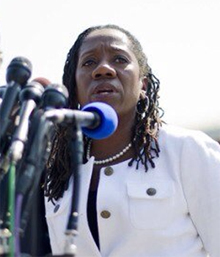Sherrilyn Ifill on Thurgood Marshall
CBS News asked noted figures in the arts, business and politics about their experience in today's civil rights movement, or about figures who inspired them in their activism.
Sherrilyn Ifill, President, Director-Counsel of NAACP's Legal Defense and Educational Fund (LDF)
Please share a civil rights figure who influenced you personally.
I am leading an organization founded and first led by Thurgood Marshall, who is the iconic civil rights figure of the 20th century. I could never speak more highly about him and the work that he did.
What is so fascinating is the ways in which Marshall had this incredible talent to be able to speak inside the courtroom and to be a brilliant, brilliant lawyer -- and to be able to speak outside the courtroom in a very engaging, familiar manner in a way that helped people understand the crisis we were in around race and inequality in very real terms. Also, the fact that he wore it very lightly.
That's something that I'm trying to model. He wore the struggle, he was in a real struggle, where even as he litigated his own life was in danger. The thousands of cases he was involved in, he was always doing it with not enough of a budget and with a tremendous amount of pressure. This was a man who, along with his team of brilliant lawyers, literally created a field of law. Somehow he managed to do it with a sense of humor and he managed to wear it in a way that made being a lawyer look very attractive, I think, for generations of lawyers to come. I'm always very mindful of the extraordinary example of leadership and vision and courage that he and the team he assembled around him represented.
When it comes to equality what issues are the most important to you?
I think America is in the grip of a crisis as it relates to voting, which is really central to the exercise of citizenship in this country. The Supreme Court 50 years ago said the right to vote is the right to preserve all rights. And yet here we are, 50 years after Freedom Summer, and nearly 50 years later after the passage of the Voting Rights Act, and we see a new wave of voter suppression efforts.
The good news is that people recognize it and are outraged and determined to hold onto their right to participate fully in the political process. We're hopeful that Congress will act this year. When you see people standing in line for six hours to vote -- as we did in 2012 -- you get two messages from it: One is, something is very wrong in America if it takes standing in a line six hours to vote. The second message is, wow! What a great thing is happening in America that people are willing to stand in a line six hours to vote. It's a time of incredible passion about voting but also a troublesome time as it relates to participation.
And then I would have to say [another issue is] our criminal justice system and our unsustainable and inhumane standard of mass incarceration. This has resulted in us having the highest per capita prison population in the world -- two million of our own citizens imprisoned, many of them for non-violent drug offenses. We will look back on this 50 to 100 years from now, and think of this as the great humanitarian crisis of the late 20th and early 21st centuries. We have to get our hands around this and solve it as soon as we can.
What needs to happen in the next 50 years for equality to be fully realized in the United States?
Well, one thing that has to happen is that we have to reengage our commitment to public life; this is the only way we can address this, [as well as] our massive social economic inequality that has become so harmful to so many Americans, and particularly to African Americans and other people of color whose economic picture and platform and opportunities were already precariously balanced, and have been so even more so undermined by the 2008 economic crisis.
At the end of the day it's really public life, public schools, public universities, public services, public roads, and transportation -- all of those aspects of public life have to be reinvigorated, [so] we have to make the proper investments in those things. Those are the things that allow people in the middle class and entering the middle class to be able to strengthen themselves financially and be able to stabilize their economic condition.
When we starve and impoverish public life, we impoverish the middle class, we impoverish the working class, and we impoverish our future.
For more info:
- Follow Sherrilyn Ifill on Twitter (@Sifill_LDF)
- NAACP Legal Defense and Educational Fund
- Follow NAACP_LDF on Twitter and Facebook
